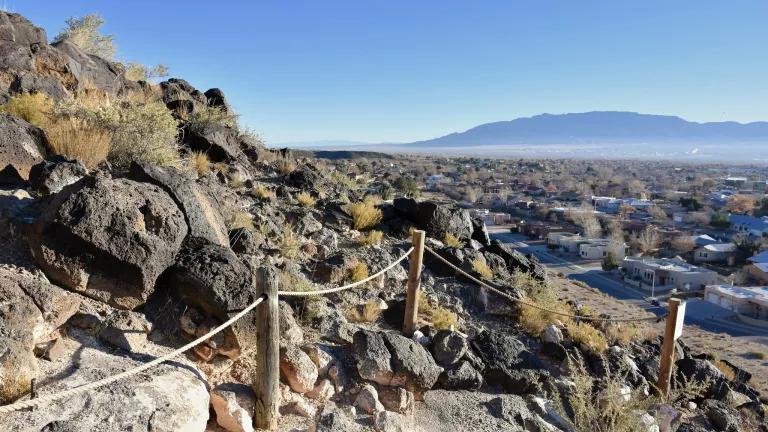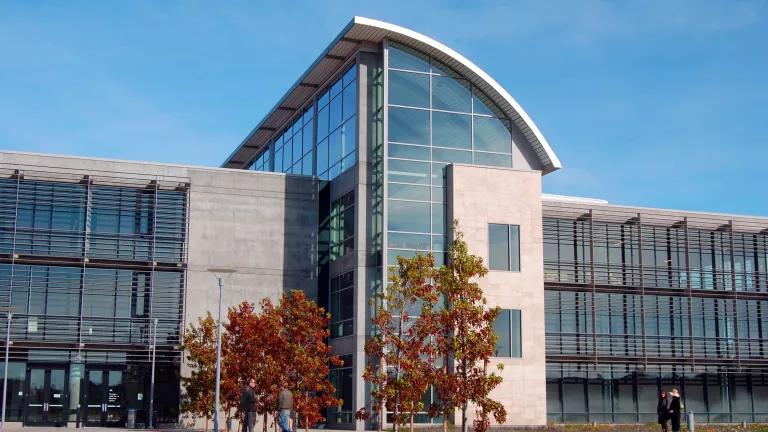AZ Helps Fossil Industry Limit Local Clean Energy Leadership

Arizona’s state government just moved to severely limit local communities’ ability to support buildings powered entirely by affordable clean electricity for decades to come. This attack on local leadership is the latest attempt to keep Americans locked into polluting fuels, and it might spread to other states.
Governor Ducey on Friday signed into law House Bill 2686, which eliminates the authority of local governments to adopt energy codes supporting buildings that use cleaner, more economic energy. This legislation is extremely troubling, especially given that local governments across the country are leading in the fight against climate change.
Americans are looking to reduce fossil fuel pollution and make the places where we live and work healthier, safer, and more affordable. By replacing appliances and equipment that rely on gas, heating oil, and propane with highly efficient versions that run on electricity—especially from clean, renewable resources like wind and solar—we can lower energy bills, keep our air cleaner, and protect our families.
Local governments have recently taken huge strides in adopting policies that transition their buildings to cleaner sources of energy. But fossil fuel interests are already taking action against these leading municipalities, suing communities that choose to no longer invest in costly fossil gas infrastructure and funding astroturf groups to spread misinformation.
What happened in Arizona could be attempted elsewhere.
Fossil Fuel Industry Seeks to Limit Options for Local Governments
The new Arizona law prohibits local governments from adopting any ordinance, code, or land use plan that supports buildings that use only clean energy to heat spaces and water. This prohibition severely limits local governments’ abilities to incentivize construction of healthier, more economic buildings via permitting processes.
Building codes have been an important and effective tool for local governments to act against climate change—particularly as inaction has plagued the federal government in recent years. The gas industry has for years fought against this grassroots movement to transition buildings to cleaner energy. They have sued and sought to mislead communities that choose to use their building codes to combat climate change. House Bill 2686 completely removes the ability of local Arizona communities to use this valuable tool to determine the health and climate impact of the buildings they live and breathe in.
Buildings Directly Affect Communities’ Physical and Financial Wellbeing
Municipal building codes are key to preserving local authority over the things that have the closest impact on our daily lives: buildings.
- Americans spend 90 percent of their time inside buildings, so the quality of the air we breathe inside our homes and places of work is at least as important as the quality of outdoor air.
- The energy used to heat, cool, and light buildings accounts for 28 percent of America’s carbon emissions.
Municipalities across the United States have been using their building energy codes to embrace building decarbonization and encourage buildings that use the most efficient, cleanest, and healthiest technologies.
Widespread Local Government Leadership on Buildings
The movement toward all-electric new construction has been swift. Last summer, Berkeley, CA, passed the nation's first all-electric new building ordinance. In the short period since, 28 California cities and counties followed suit with strong building codes and other local ordinances aimed at cutting fossil fuel pollution from homes and businesses. Several dozen others are working on similar actions to promote clean electric new buildings.
California is not alone in taking action in the face of federal policy inaction and even regression: New York City's Local Law 97, enacted last May, assigns an annual emissions cap for 50,000 large buildings starting in 2024. A new policy in Seattle provides incentives for homeowners to replace oil heating systems with clean and efficient electric heat pumps. Several other large cities across the country are stepping up to meet Paris climate goals in a variety of ways as part of the American Cities Climate Challenge.
States such as Maine and Massachusetts are also moving toward building electrification by encouraging adoption of heat pumps, and a handful of other states, including New York and Rhode Island, are recognizing the importance of building electrification as they draft climate and energy plans and commit to the necessary investments.
Action Today Prevents High Costs Tomorrow
Efficient all-electric buildings are more economic and easier to construct. Relying on efficient, electric-powered equipment and avoiding the need to install a gas line connection, meter, indoor piping, and venting equipment saves money and time. This can add up to thousands of dollars of savings in building costs for the individual buyer and put downward pressure on rates for everyone by reducing system costs.
Forward-thinking local governments are realizing that we can only meet our long-term climate goals if we decarbonize our buildings. In light of this, they do not want to saddle their citizens with millions of dollars in fossil fuel infrastructure expenditures that will go underutilized by mid-century. Rather than spend resources on infrastructure for a fuel that runs counter to their citizens’ health, economic, and environmental interests, local governments are choosing to focus their investments on a clean future powered by renewable electricity.
Building energy codes and permitting processes are key tools for local governments that want to support healthier, more affordable buildings, and a better climate. Legislation like Arizona’s House Bill 2686 reaches too far into local communities’ ability to improve their building stock and determine their own future. This is a dangerous fossil fuel industry tactic that must not be allowed to spread to other states.




